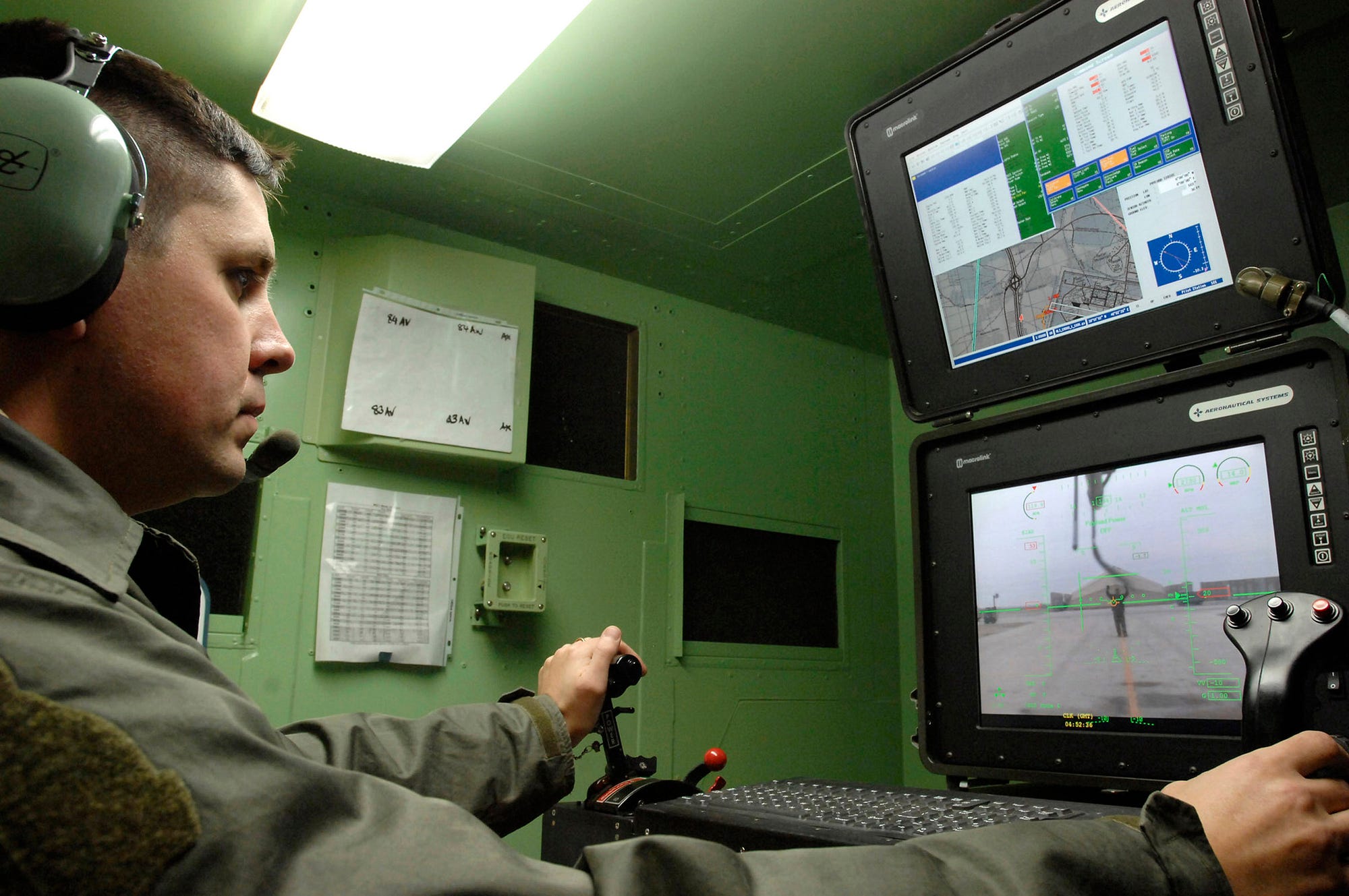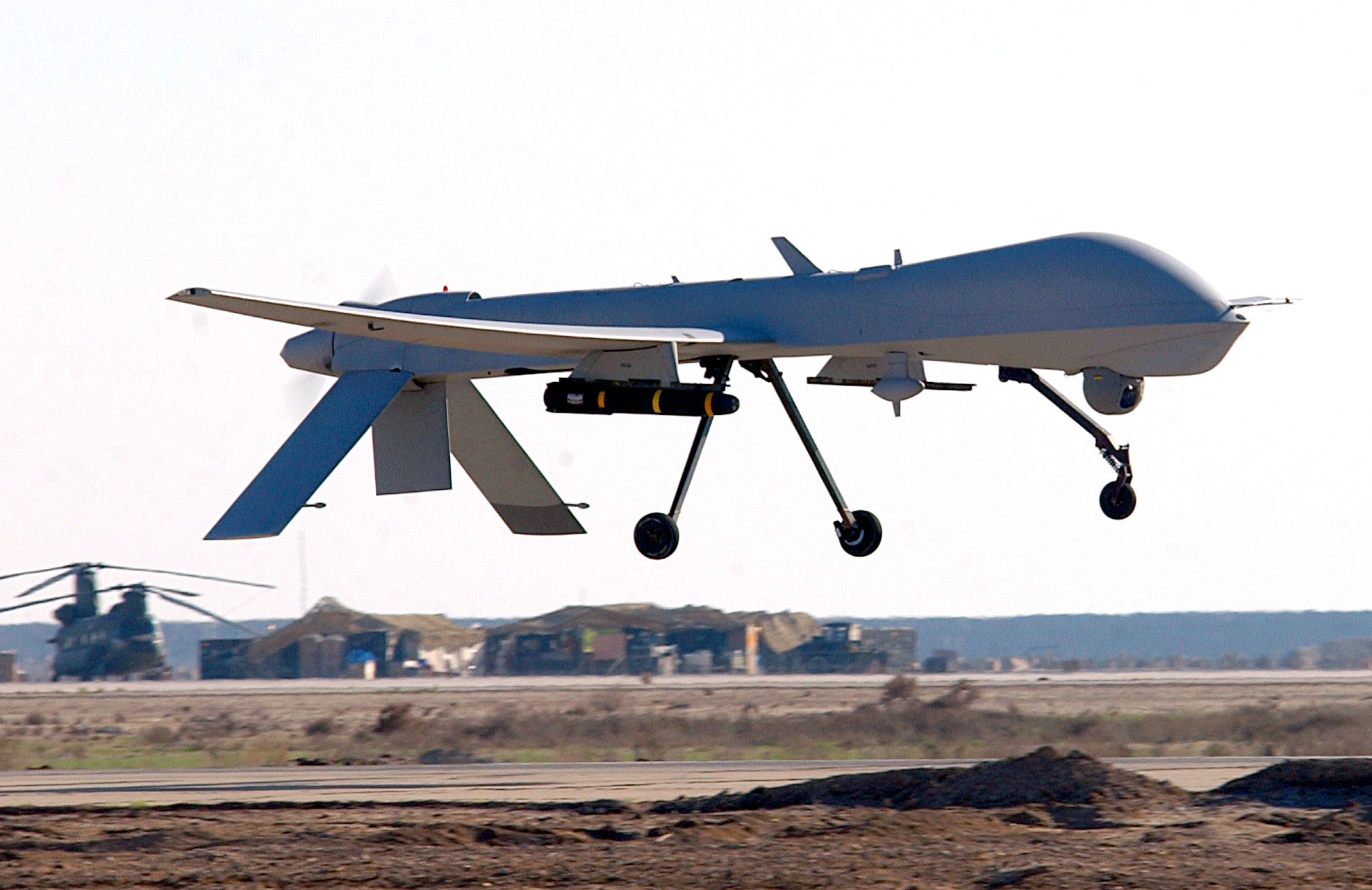Germany’s Left Party opposes U.S. drone war
In October 2014 in the Bundestag, the German parliament, Ali Jaber—from a remote village in Yemen—spoke about his family’s suffering. The day after his son’s wedding in August 2012, his cousin and brother-in-law left the house to talk to three alleged Al-Qaeda supporters, trying to warn them that they were on the wrong path in siding with the Islamic terrorists.
Shortly after they had left the house, his relatives were dead. An American drone killed the five men.
On his trip to Germany, Jaber is being accompanied by members of the American NGO Reprieve and the German Justice organization ECCHR, which filed a lawsuit against the German government for supporting the U.S. drone war.
Without the U.S. military air base in Germany’s Ramstein, Ali Jaber argues, the killings of two of his family members and of many other civilians in Yemen would not have occurred—and his loved ones would still be alive.
Since 2011, American drones have killed as many as 393 people in Yemen alone—58 of them civilians. This according to a 2013 U.N. report.
In this article, we wish to elucidate three reasons why the German public opposes U.S. drone attacks and the German logistical assistance that makes the attacks possible.
 Above—a U.S. Air Force communications specialist at Ramstein. At top—an Air Force Reaper drone. Air Force photos
Above—a U.S. Air Force communications specialist at Ramstein. At top—an Air Force Reaper drone. Air Force photos
What’s the problem?
German media investigations have revealed that the military air base in Ramstein—as well as the U.S. Africa Command headquarters at Stuttgart—are vital for the American drone war in Yemen and Africa.
In 2008, Germany agreed to host AFRICOM in Stuttgart — even after other European countries denied the Americans’ request.
Without these military bases in Germany, the U.S. drone attacks would be impossible. Former drone pilot Brandon Bryant, who was involved in more than 1,600 attacks, told one of Germany’s main news channels that “the data always went through Ramstein.”
Based on these and other revelations, the democratic socialist Left Party parliamentary group in the German Bundestag has repeatedly asked the government about its involvement in the U.S. drone war.
The Pentagon wages its drone wars from American soil, with drone pilots pressing buttons like in a computer game. But the pilots communicate with their robotic aircraft via fiber-optic cables and satellites relaying through U.S. military bases in Europe.
 A U.S. Air Force drone operator. Air Force photo
A U.S. Air Force drone operator. Air Force photo
Extrajudicial killings contravene German constitutional law
The U.S. drone war—which Pres. Barack Obama has expanded—violates international law and raises judicial, political and moral questions, not just in Germany but also in the U.S., where the peace movement and NGOs such as Reprieve oppose this new form of warfare.
The transfer of information used in extrajudicial killings violates German constitutional principles and national law. “If the German government is informed and does not voice protest, the killing of a suspect of terrorism by an armed drone outside of an armed conflict entails that the German government participates in an offense against international law,” explains Thilo Marauhn, an international law expert.
A majority of Germans rejects military intervention in Iraq, Afghanistan and many other countries. That’s in part why the Left Party—which won 8.6 percent of the vote in the last national election in 2013 and thus constitutes the strongest opposition party in the Bundestag—along with the peace movement is worried about drone attacks.
While Germany has participated in numerous international military interventions since the end of the Cold War, beginning with the NATO attack on Yugoslavia in 1999, the Germans have nevertheless been skeptical of the expensive and bloody wars in Iraq and Afghanistan, which together have claimed more than half a million lives.
The Left is the only party in parliament that rejects war as a means of achieving peace. It has voted against all international military missions as well as opposed rearmament and weapons exports.
The Left’s anti-militarism differentiates it from all the other parties in the German political establishment. In place of large military budgets, the party demands stronger civil and humanitarian infrastructure in order to prevent violence and help those in need.
 A U.S. Air Force Predator drone. Air Force photo
A U.S. Air Force Predator drone. Air Force photo
The German government violates the parliamentary right to question and answer
In order to find out more about the U.S. drone war from German soil—and to get a reaction of the government to the allegations in investigative media reports—Niema Movassat and other Left MPs have filed information requests with the government. The only answers have been denials.
“No, U.S. drones aren’t being steered from U.S. stations in Germany,” one response reads. “There’s no reason to doubt the U.S. statement that drones are not being commanded from Germany,” according to another.
These answers ignore the fact that even American military officials have admitted that drone attacks take place with technical support from Ramstein and AFRICOM. Furthermore, the questioners never used the verbs “command” or “steer.” Instead, the Left MPs have asked about different ways of “support”—for example, the data flows through Ramstein and AFRICOM.
In addition to denying and ignoring published reports, in October 2014 the German government stressed that it had sent the U.S. government a questionnaire and reminded the Americans again and again to respond.
It’s clear that the government is not only violating international law by helping the U.S. wage its deadly drone war, but also violating the constitution.
In a separate matter regarding the German secret services, the High Court in Karlsruhe has already admonished the government to comply with the right of the parliamentarians to interrogate the government.
The government’s ignorance and disrespect to questions of the opposition violates democratic principles. The public is entitled to be informed in a transparent way about Germany’s support of the U.S. drone war.
It’s a scandal that the German government is obviously not able to act sovereign enough in order to demand from its “closest ally” to respond to questions about these military bases that have been pending since April 2014.
That the government is now reminding with more emphasis, shows how powerless Germany seems to be vis-à-vis the United States. According to chancellor Merkel’s favorite practice—to sit out problems—she rather waits for the public to lose interest. But it’s necessary that she seriously deals with the severe allegation.
Jaber says that life in his village has changed completely since the drone killed his relatives. The people are afraid to walk on the streets past 8:00 p.m., so they stay home. And they don’t dare to sleep on their roofs anymore when it is too hot in their houses, as they used to.
Everyone knows they can be hit next.
Together with Jaber, the Left demands the U.S. military air base in Ramstein and AFRICOM in Stuttgart shut down.
Niema Movassat has been a member of the German parliament for the Left Party since 2009. He is the chairman for his party in the Parliamentary Committee for Economic Cooperation and Development as well as the spokesperson for World Nutrition.
In October 2014 in the Bundestag, the German parliament, Ali Jaber—from a remote village in Yemen—spoke about his family’s suffering. The day after his son’s wedding in August 2012, his cousin and brother-in-law left the house to talk to three alleged Al-Qaeda supporters, trying to warn them that they were on the wrong path in siding with the Islamic terrorists.
Shortly after they had left the house, his relatives were dead. An American drone killed the five men.
On his trip to Germany, Jaber is being accompanied by members of the American NGO Reprieve and the German Justice organization ECCHR, which filed a lawsuit against the German government for supporting the U.S. drone war.
Without the U.S. military air base in Germany’s Ramstein, Ali Jaber argues, the killings of two of his family members and of many other civilians in Yemen would not have occurred—and his loved ones would still be alive.
Since 2011, American drones have killed as many as 393 people in Yemen alone—58 of them civilians. This according to a 2013 U.N. report.
In this article, we wish to elucidate three reasons why the German public opposes U.S. drone attacks and the German logistical assistance that makes the attacks possible.
 Above—a U.S. Air Force communications specialist at Ramstein. At top—an Air Force Reaper drone. Air Force photos
Above—a U.S. Air Force communications specialist at Ramstein. At top—an Air Force Reaper drone. Air Force photosWhat’s the problem?
German media investigations have revealed that the military air base in Ramstein—as well as the U.S. Africa Command headquarters at Stuttgart—are vital for the American drone war in Yemen and Africa.
In 2008, Germany agreed to host AFRICOM in Stuttgart — even after other European countries denied the Americans’ request.
Without these military bases in Germany, the U.S. drone attacks would be impossible. Former drone pilot Brandon Bryant, who was involved in more than 1,600 attacks, told one of Germany’s main news channels that “the data always went through Ramstein.”
Based on these and other revelations, the democratic socialist Left Party parliamentary group in the German Bundestag has repeatedly asked the government about its involvement in the U.S. drone war.
The Pentagon wages its drone wars from American soil, with drone pilots pressing buttons like in a computer game. But the pilots communicate with their robotic aircraft via fiber-optic cables and satellites relaying through U.S. military bases in Europe.
 A U.S. Air Force drone operator. Air Force photo
A U.S. Air Force drone operator. Air Force photoExtrajudicial killings contravene German constitutional law
The U.S. drone war—which Pres. Barack Obama has expanded—violates international law and raises judicial, political and moral questions, not just in Germany but also in the U.S., where the peace movement and NGOs such as Reprieve oppose this new form of warfare.
The transfer of information used in extrajudicial killings violates German constitutional principles and national law. “If the German government is informed and does not voice protest, the killing of a suspect of terrorism by an armed drone outside of an armed conflict entails that the German government participates in an offense against international law,” explains Thilo Marauhn, an international law expert.
A majority of Germans rejects military intervention in Iraq, Afghanistan and many other countries. That’s in part why the Left Party—which won 8.6 percent of the vote in the last national election in 2013 and thus constitutes the strongest opposition party in the Bundestag—along with the peace movement is worried about drone attacks.
While Germany has participated in numerous international military interventions since the end of the Cold War, beginning with the NATO attack on Yugoslavia in 1999, the Germans have nevertheless been skeptical of the expensive and bloody wars in Iraq and Afghanistan, which together have claimed more than half a million lives.
The Left is the only party in parliament that rejects war as a means of achieving peace. It has voted against all international military missions as well as opposed rearmament and weapons exports.
The Left’s anti-militarism differentiates it from all the other parties in the German political establishment. In place of large military budgets, the party demands stronger civil and humanitarian infrastructure in order to prevent violence and help those in need.
 A U.S. Air Force Predator drone. Air Force photo
A U.S. Air Force Predator drone. Air Force photoThe German government violates the parliamentary right to question and answer
In order to find out more about the U.S. drone war from German soil—and to get a reaction of the government to the allegations in investigative media reports—Niema Movassat and other Left MPs have filed information requests with the government. The only answers have been denials.
“No, U.S. drones aren’t being steered from U.S. stations in Germany,” one response reads. “There’s no reason to doubt the U.S. statement that drones are not being commanded from Germany,” according to another.
These answers ignore the fact that even American military officials have admitted that drone attacks take place with technical support from Ramstein and AFRICOM. Furthermore, the questioners never used the verbs “command” or “steer.” Instead, the Left MPs have asked about different ways of “support”—for example, the data flows through Ramstein and AFRICOM.
In addition to denying and ignoring published reports, in October 2014 the German government stressed that it had sent the U.S. government a questionnaire and reminded the Americans again and again to respond.
It’s clear that the government is not only violating international law by helping the U.S. wage its deadly drone war, but also violating the constitution.
In a separate matter regarding the German secret services, the High Court in Karlsruhe has already admonished the government to comply with the right of the parliamentarians to interrogate the government.
The government’s ignorance and disrespect to questions of the opposition violates democratic principles. The public is entitled to be informed in a transparent way about Germany’s support of the U.S. drone war.
It’s a scandal that the German government is obviously not able to act sovereign enough in order to demand from its “closest ally” to respond to questions about these military bases that have been pending since April 2014.
That the government is now reminding with more emphasis, shows how powerless Germany seems to be vis-à-vis the United States. According to chancellor Merkel’s favorite practice—to sit out problems—she rather waits for the public to lose interest. But it’s necessary that she seriously deals with the severe allegation.
Jaber says that life in his village has changed completely since the drone killed his relatives. The people are afraid to walk on the streets past 8:00 p.m., so they stay home. And they don’t dare to sleep on their roofs anymore when it is too hot in their houses, as they used to.
Everyone knows they can be hit next.
Together with Jaber, the Left demands the U.S. military air base in Ramstein and AFRICOM in Stuttgart shut down.
Niema Movassat has been a member of the German parliament for the Left Party since 2009. He is the chairman for his party in the Parliamentary Committee for Economic Cooperation and Development as well as the spokesperson for World Nutrition.
No comments:
Post a Comment